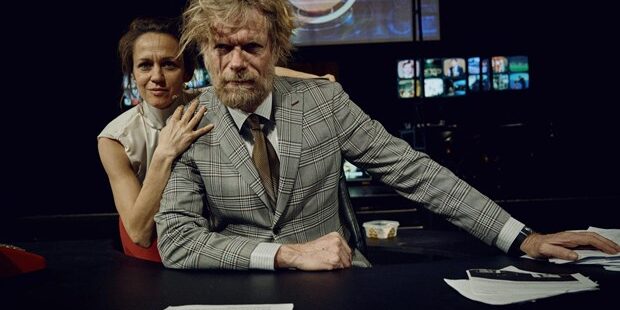Mladinsko Theatre, Ljubljana, 20th April 2022
In the middle of a live broadcast, television host Howard Beale (Matija Vastl) announces his suicide, which viewers will be able to watch live.
This triggers an extraordinary jump in ratings. And so the game begins. For the sake of ratings, Beale gets his own show, where he pours his anger, cynicism and nihilism over the world for the benefit of his viewers. But the more he gets angry at the dirty world of the media, the more money flows into their coffers. The game soon becomes a fight for life and death.
Network, directed by Matjaž Pograjc, is an adaptation of the 1976 film written by Paddy Chayefsky and directed by Sidney Lumet. Adapted for the stage by British playwright Lee Hall, it premiered at the National Theatre in London in 2017 with Breaking Bad’s Bryan Cranston playing Beale.
As in the movie, the TV network, whose ratings are falling, is searching for a way to make money, be it via a crazy host or with terrorists. The narrative centres on a dispute between the old world of journalistic values, embodied by Max Schumacher, the head of the news program (Matej Recer) who wants to keep people informed, and the new model of television, embodied by a younger colleague, Diana Christiensen, (Katarina Stegnar).
The stage is filled with cameras and cables with alternating scenes shown on the projection screen in a way that reminds us of a television studio. Otherwise, the look of the show derives from the aesthetics of the US in the 1970s, when the film was made. The costumes of the characters bring to mind the iconic films of that time, and the screens, when not showing live broadcasts of events on stage, display a set of television and film references.
When Christiensen changes from a red skirt into red pants after she gets a more senior job, it’s a way of showing a woman who has taken a classic “male” position, but it also highlights the patriarchal system, where a woman can only succeed in her career if she does not have or abandons stereotypical female behavioural patterns. Beale himself is also undoubtedly a product of this world – and this system.
Vastl performs Beale’s increasingly psychotic state with detailed changes and without going over the top. He seems detached from the rest of the characters, which is in keeping with the narrative.
However the very fact that the protagonist is a successful, middle-aged white man underscores the emptiness of his messianism. Although he plays the role of the rebel within the system, he is clearly among those who can afford this kind of disobedience. He is exploited, yes, but it’s hard not to feel that a similarly “crazy” woman or someone of another race or culture would not be given such a platform.
Greta Godnič’s design recreates a television studio in the theatre, with a desk for the host located in the middle of the stage – and at the centre of events. There are other rooms dotted around this central desk, including a wardrobe department and an editorial office. Events also take place away from the main stage, in the backstage spaces and corridors of the theatre and even in the parking lot. We watch these scenes via cameras that follow the actors as they move away from the stage. This creates a voyeuristic feeling – it reminds us of the “all-seeing” cameras in reality shows. It’s a technically ambitious and well-executed directorial choice, but never sacrifices clarity.
However, these “outside” scenes can sometimes seem a bit forced and they don’t always seem necessary. Despite the fast rhythm of the changing scenes, Pograjc’s production is long – and it feels ‘long’.
Beale experiences more new psychological fractures; several times he is almost fired. In addition to his saga, we also get to know the love lives of other characters. Schumacher gets involved in an affair with Christiensen. Their relationship is effectively used to show the rift between journalists of the old and the new school, but when Schumacher’s wife gets involved, everything becomes unnecessarily detailed.
The length of the production might be a consequence of faithfulness to the original film. But the decision to stage it without a break only emphasises this length and, despite the natural style of acting, some of the dialogue also feels a bit rigid and dated.
The production is well supported by three employees of the television station who, as things become increasingly absurd, become circus performers and start to dance and perform with bunny masks and stylized voices. In a witty and visually appealing way, they embody the devaluation of media content, at the same time showing how they “sold” themselves, but, sadly, their role remains somewhat isolated from the rest of the production.
With escalating tension, Network ends with the murder of Beale, the host who has stopped carrying golden eggs. The audience is left in the hall alone, as the key event, as in Greek ancient tragedies, takes place off stage. On the stage is written, however, the play’s final message, which says that: the ultimate truth is that the worst evil is any absolute belief.
Whether it’s Beale who utters these words, or the authors of the show, is not clear. Moreover, the production has successfully shown for itself the results of absolute beliefs that do not take into account the complexity of situations, society and the people in it. The last “truth” therefore turns out to be somewhat explanatory.
Despite these shortcomings, the production clearly indicates that not much has changed in the media landscape since the original film was released. Though today we can view footage of suicides, and terrorist attacks on social networks, the content is essentially the same. You could even say that the corporations that serve us this content are the same too.
Credits:
Director: Matjaž Pograjc,
Costume design: Neli Štrukelj
Space design: Greta Godnič
Music: Tibor Mihelič Syed
Choreography: Branko Potočan
Lighting design: Andrej Petrovčič
Sound design: Jure Vlahovič
For tickets and further information, visit: Mladinsko.com
Further reading: review Fever at Mladinsko Theatre; review of Trimalchio’s Dinner at Mladinsko Theatre
Iva Š. Slosar is a student of dramaturgy and performing arts. She writes theatre criticism for web portals and participates in the cultural department of Radio Študent (Slovenia). She is also engaged in drama writing and theatrical creation as a practical dramaturg.








